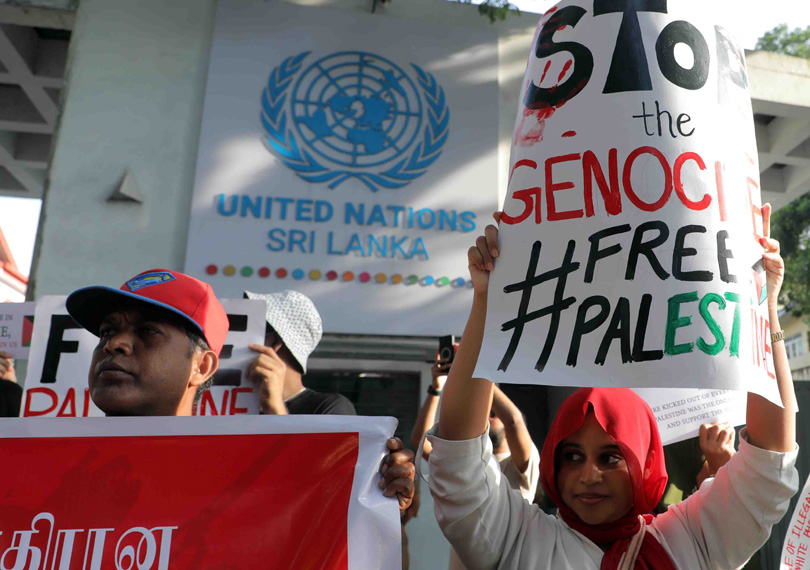
Photograph: Sunday Times
The violence in Israel and Palestine over the last month has been horrific. Thousands have already been killed and it shows no signs of abating in the days and weeks to come. For many around the world, Eelam Tamils included, it has been difficult to observe. But what has added to the dismay for Tamils in particular, is the hypocritical response by Sri Lankans across the political spectrum to the violence in Gaza.
It is not difficult to see the parallels that many Tamils have already drawn. The scenes in the Middle East have evoked much of the trauma of Mullivaikkal in 2009, where brutal killings took place, hospitals were shelled, civilians displaced and aid halted. More than 14 years later, the wounds of that genocide have not healed, with those responsible for the atrocities still roaming free. In the South of the island, the conflict in Gaza has also seemingly not gone amiss. Sinhala leaders have swiftly condemned both sides and called for an immediate ceasefire to allow aid into Gaza, but with almost no reflection on Sri Lanka’s own tortuous history.
Former Sri Lankan president Mahinda Rajapaksa visited the Palestinian embassy in Colombo, expressing his solidarity and asserting “that war is never the answer”. The same Rajapaksa that led a military offensive massacring tens of thousands of Tamils, repeatedly bombed hospitals and stands accused of war crimes, crimes against humanity and genocide. Similarly, Sri Lanka’s opposition leader Sajith Premadasa called on the UN Security Council to intervene in the conflict, yet slammed any UN-assisted inquiry into Sri Lanka’s crimes as “international interference in the country”. And Sri Lanka’s current president Ranil Wickremesinghe touted his own “four-state solution” to the Israel-Palestine crisis, all whilst staunchly opposing any meaningful devolution to the island’s Tamils. Even the extremist Sinhala hard-right politician Champika Ranawaka, a man that once threatened a ‘hundred Mullivaikkals’ and called for the annihilation of “traitors”, has called for humanitarian aid to be let into Gaza.
It is not just Sri Lanka’s politicians that are guilty of such hypocrisy. In Colombo, protestors held placards denouncing the ‘genocide’ in Palestine, but few outside of the Tamils in the Sri Lankan capital have called out the genocide that the state has carried out for decades in the North-East. Sri Lanka’s so-called progressives and liberals that were lauded for their entrenched opposition to Tamil nationalism and fiercely opposed a ceasefire during the 2009 massacres, must look at Gaza and now too be feeling sheepish.
As jarring as this may be to the Tamil people, none of this will come as a surprise. Whilst the South shows empathy towards those in Palestine, for decades Eelam Tamils have received apathy at best, and have been actively slaughtered at worst.
This duplicity is to be expected from Sri Lanka’s politicians. Their call for the recognition of Palestinian nationhood may have the veneer of solidarity, but it stems back to Cold War politics and has little principled backing. Indeed, Sri Lanka has been a loyal client of Israeli arms companies, having purchased billions of dollars of weaponry for its war on the Tamil people. The very same Kfir jets that Sinhala leaders sent to bomb the Vanni, they now demand stop bombing Gaza. This is a point not lost on the rabid Sinhala Buddhist clergy, who have at least been consistent, and enthusiastically backed Israel’s offensive citing its years of military support for their own wars. If Sri Lanka’s leaders truly did see a two-state solution between Israel and Palestine as the answer to the decades of conflict in the region, as almost all have claimed, then why not the same at home? The hollowness of Colombo’s position on Palestine needs to be resoundingly called out.
For the rest of the island, the situation in the Middle East and their reaction to it, is a chance to reflect on Sri Lanka’s own bloody past and turmoiled present. Tamils continue to protest the military occupation of their homeland, still demand justice for the genocide and to this day yearn for autonomy and the right to choose their own political destiny. As many around the world are recognising, that cannot be quelled with bombs and bullets.
We need your support
Sri Lanka is one of the most dangerous places in the world to be a journalist. Tamil journalists are particularly at threat, with at least 41 media workers known to have been killed by the Sri Lankan state or its paramilitaries during and after the armed conflict.
Despite the risks, our team on the ground remain committed to providing detailed and accurate reporting of developments in the Tamil homeland, across the island and around the world, as well as providing expert analysis and insight from the Tamil point of view
We need your support in keeping our journalism going. Support our work today.
For more ways to donate visit https://donate.tamilguardian.com.

